- Home
- Ralph Ellison
Invisible Man Page 7
Invisible Man Read online
Page 7
“What about their men folk?”
I hesitated. Why did he find this so strange?
“He hates us, sir,” I said.
“You say he; aren’t both the women married?”
I caught my breath. I’d made a mistake. “The old one is, sir,” I said reluctantly.
“What happened to the young woman’s husband?”
“She doesn’t have any— That is … I—”
“What is it, young man? Do you know these people?”
“Only a little, sir. There was some talk about them up on the campus a while back.”
“What talk?”
“Well, the young woman is the old woman’s daughter …”
“And?”
“Well, sir, they say … you see … I mean they say the daughter doesn’t have a husband.”
“Oh, I see. But that shouldn’t be so strange. I understand that your people— Never mind! Is that all?”
“Well, sir …”
“Yes, what else?”
“They say that her father did it.”
“What!”
“Yes, sir … that he gave her the baby.”
I heard the sharp intake of breath, like a toy-balloon suddenly deflated. His face reddened. I was confused, feeling shame for the two women and fear that I had talked too much and offended his sensibilities.
“And did anyone from the school investigate this matter?” he asked at last.
“Yes, sir,” I said.
“What was discovered?”
“That it was true—they say.”
“But how does he explain his doing such a—a—such a monstrous thing?”
He sat back in the seat, his hands grasping his knees, his knuckles bloodless. I looked away, down the heat-dazzling concrete of the highway. I wished we were back on the other side of the white line, heading back to the quiet green stretch of the campus.
“It is said that the man took both his wife and his daughter?”
“Yes, sir.”
“And that he is the father of both their children?”
“Yes, sir.”
“No, no, no!”
He sounded as though he were in great pain. I looked at him anxiously. What had happened? What had I said?
“Not that! No …” he said, with something like horror.
I saw the sun blaze upon the new blue overalls as the man appeared around the cabin. His shoes were tan and new and he moved easily over the hot earth. He was a small man and he covered the yard with a familiarity that would have allowed him to walk in the blackest darkness with the same certainty. He came and said something to the woman as he fanned himself with a blue bandanna handkerchief. But they appeared to regard him sullenly, barely speaking, and hardly looking in his direction.
“Would that be the man?” Mr. Norton asked.
“Yes, sir. I think so.”
“Get out!” he cried. “I must talk with him.”
I was unable to move. I felt surprise and a dread and resentment of what he might say to Trueblood and his women, the questions he might ask. Why couldn’t he leave them alone!
“Hurry!”
I climbed from the car and opened the rear door. He clambered out and almost ran across the road to the yard, as though compelled by some pressing urgency which I could not understand. Then suddenly I saw the two women turn and run frantically behind the house, their movements heavy and flat-footed. I hurried behind him, seeing him stop when he reached the man and the children. They became silent, their faces clouding over, their features becoming soft and negative, their eyes bland and deceptive. They were crouching behind their eyes waiting for him to speak—just as I recognized that I was trembling behind my own. Up close I saw what I had not seen from the car: The man had a scar on his right cheek, as though he had been hit in the face with a sledge. The wound was raw and moist and from time to time he lifted his handkerchief to fan away the gnats.
“I, I—” Mr. Norton stammered, “I must talk with you!”
“All right, suh,” Jim Trueblood said without surprise and waited.
“Is it true … I mean did you?”
“Suh?” Trueblood asked, as I looked away.
“You have survived,” he blurted. “But is it true … ?”
“Suh?” the farmer said, his brow wrinkling with bewilderment.
“I’m sorry, sir,” I said, “but I don’t think he understands you.”
He ignored me, staring into Trueblood’s face as though reading a message there which I could not perceive.
“You did and are unharmed!” he shouted, his blue eyes blazing into the black face with something like envy and indignation. Trueblood looked helplessly at me. I looked away. I understood no more than he.
“You have looked upon chaos and are not destroyed!”
“No suh! I feels all right.”
“You do? You feel no inner turmoil, no need to cast out the offending eye?”
“Suh?”
“Answer me!”
“I’m all right, suh,” Trueblood said uneasily. “My eyes is all right too. And when I feels po’ly in my gut I takes a little soda and it goes away.”
“No, no, no! Let us go where there is shade,” he said, looking about excitedly and going swiftly to where the porch cast a swath of shade. We followed him. The farmer placed his hand on my shoulder, but I shook it off, knowing that I could explain nothing. We sat on the porch in a semi-circle in camp chairs, me between the sharecropper and the millionaire. The earth around the porch was hard and white from where wash water had long been thrown.
“How are you faring now?” Mr. Norton asked. “Perhaps I could help.”
“We ain’t doing so bad, suh. ’Fore they heard ’bout what happen to us out here I couldn’t git no help from nobody. Now lotta folks is curious and goes outta they way to help. Even the biggity school folks up on the hill, only there was a catch to it! They offered to send us clean outta the county, pay our way and everything and give me a hundred dollars to git settled with. But we likes it here so I told ’em No. Then they sent a fellow out here, a big fellow too, and he said if I didn’t leave they was going to turn the white folks loose on me. It made me mad and it made me scared. Them folks up there to the school is in strong with the white folks and that scared me. But I thought when they first come out here that they was different from when I went up there a long time ago looking for some book learning and some points on how to handle my crops. That was when I had my own place. I thought they was trying to he’p me, on accounta I got two women due to birth ’bout the same time.
“But I got mad when I found they was tryin’ to git rid of us ’cause they said we was a disgrace. Yessuh, I got real mad. So I went down to see Mr. Buchanan, the boss man, and I tole him ’bout it and he give me a note to the sheriff and tole me to take it to him. I did that, jus’ like he tole me. I went to the jailhouse and give Sheriff Barbour the note and he ask me to tell him what happen, and I tole him and he called in some more men and they made me tell it again. They wanted to hear about the gal lots of times and they gimme something’ to eat and drink and some tobacco. Surprised me, ‘cause I was scared and spectin’ somethin’ different. Why, I guess there ain’t a colored man in the county who ever got to take so much of the white folkses’ time as I did. So finally they tell me not to worry, that they was going to send word up to the school that I was to stay right where I am. Them big nigguhs didn’t bother me, neither. It just goes to show yuh that no matter how biggity a nigguh gits, the white folks can always cut him down. The white folks took up for me. And the white folks took to coming out here to see us and talk with us. Some of ’em was big white folks, too, from the big school way cross the State. Asked me lots ’bout what I thought ’bout things, and ’bout my folks and the kids, and wrote it all down in a book. But best of all, suh, I got more work now than I ever did have before …”
He talked willingly now, with a kind of satisfaction and no trace of hesitancy or shame. The old man listened
with a puzzled expression as he held an unlit cigar in his delicate fingers.
“Things is pretty good now,” the farmer said. “Ever time I think of how cold it was and what a hard time we was having I gits the shakes.”
I saw him bite into a plug of chewing tobacco. Something tinkled against the porch and I picked it up, gazing at it from time to time. It was a hard red apple stamped out of tin.
“You see, suh, it was cold and us didn’t have much fire. Nothin’ but wood, no coal. I tried to git help but wouldn’t nobody help us and I couldn’t find no work or nothin’. It was so cold all of us had to sleep together; me, the ole lady and the gal. That’s how it started, suh.”
He cleared his throat, his eyes gleaming and his voice taking on a deep, incantatory quality, as though he had told the story many, many times. Flies and fine white gnats swarmed about his wound.
“That’s the way it was,” he said. “Me on one side and the ole lady on the other and the gal in the middle. It was dark, plum black. Black as the middle of a bucket of tar. The kids was sleeping all together in they bed over in the corner. I must have been the last one to go to sleep, ‘cause I was thinking ’bout how to git some grub for the next day and ’bout the gal and the young boy what was startin’ to hang ’round her. I didn’t like him and he kept comin’ through my thoughts and I made up my mind to warn him away from the gal. It was black dark and I heard one of the kids whimper in his sleep and the last few sticks of kindlin’ crackin’ and settlin’ in the stove and the smell of the fat meat seemed to git cold and still in the air just like meat grease when it gits set in a cold plate of molasses. And I was thinkin’ ’bout the gal and this boy and feelin’ her arms besides me and hearing the ole lady snorin’ with a kinda moanin’ and a-groanin’ on the other side. I was worryin’ ’bout my family, how they was goin’ to eat and all, and I thought ’bout when the gal was little like the younguns sleepin’ over in the corner and how I was her favorite over the ole lady. There we was, breathin’ together in the dark. Only I could see ’em in my mind, knowin’ ’em like I do. In my mind I looked at all of ’em, one by one. The gal looks just like the ole lady did when she was young and I first met her, only better lookin’. You know, we gittin’ to be a better-lookin’ race of people …
“Anyway, I could hear ’em breathin’ and though I hadn’t been it made me sleepy. Then I heard the gal say, ‘Daddy,’ soft and low in her sleep and I looked, tryin’ to see if she was still awake. But all I can do is smell her and feel her breath on my hand when I go to touch her. She said it so soft I couldn’t be sure I had heard anything, so I just laid there listenin’. Seems like I heard a whippoorwill callin’, and I thought to myself, Go on away from here, we’ll whip ole Will when we find him. Then I heard the clock up there at the school strikin’ four times, lonesome like.
“Then I got to thinkin’ ’bout way back when I left the farm and went to live in Mobile and ’bout a gal I had me then. I was young then—like this young fellow here. Us lived in a two-story house ’longside the river, and at night in the summertime we used to lay in bed and talk, and after she’d gone off to sleep I’d be awake lookin’ out at the lights comin’ up from the water and listenin’ to the sounds of the boats movin’ along. They used to have musicianers on them boats, and sometimes I used to wake her up to hear the music when they come up the river. I’d be layin’ there and it would be quiet and I could hear it comin’ from way, way off. Like when you quail huntin’ and it’s getting dark and you can hear the boss bird whistlin’ tryin’ to get the covey together again, and he’s coming toward you slow and whistlin’ soft, ‘cause he knows you somewhere around with your gun. Still he got to round them up, so he keeps on comin’. Them boss quails is like a good man, what he got to do he do.
“Well, that’s the way the boats used to sound. Comin’ close to you from far away. First one would be comin’ to you when you almost sleep and it sounded like somebody hittin’ at you slow with a big shiny pick. You see the pick-point comin’ straight at you, comin’ slow too, and you can’t dodge; only when it goes to hit you it ain’t no pick a’tall but somebody far away breakin’ little bottles of all kindsa colored glass. It’s still comin’ at you though. Still comin’. Then you hear it close up, like when you up in the second-story window and look down on a wagonful of watermelons, and you see one of them young juicy melons split wide open a-layin’ all spread out and cool and sweet on top of all the striped green ones like it’s waitin’ just for you, so you can see how red and ripe and juicy it is and all the shiny black seeds it’s got and all. And you could hear the sidewheels splashin’ like they don’t want to wake nobody up; and us, me and the gal, would lay there feelin’ like we was rich folks and them boys on the boats would be playin’ sweet as good peach brandy wine. Then the boats would be past and the lights would be gone from the window and the music would be goin’ too. Kinda like when you watch a gal in a red dress and a wide straw hat goin’ past you down a lane with the trees on both sides, and she’s plump and juicy and kinda switchin’ her tail ’cause she knows you watchin’ and you know she know, and you just stands there and watches ’til you can’t see nothin’ but the top of her red hat and then that goes and you know she done dropped behind a hill—I seen me a gal like that once. All I could hear then would be that Mobile gal—name of Margaret—she be breathin’ beside me, and maybe ’bout that time she’d say, ‘Daddy, you still ’wake?’ and then I’d grunt, “Uhhuh’ and drop on off—Gent’mens,” Jim Trueblood said, “I likes to recall them Mobile days.
“Well, it was like that when I heard Matty Lou say, ‘Daddy,’ and I knowed she musta been dreamin’ ’bout somebody from the way she said it and I gits mad wonderin’ if it’s that boy. I listen to her mumblin’ for a while tryin’ to hear if she calls his name, but she don’t, and I remember that they say if you put the hand of a person who’s talkin’ in his sleep in warm water he’ll say it all, but the water is too cold and I wouldn’t have done it anyway. But I’m realizin’ that she’s a woman now, when I feels her turn and squirm against me and throw her arm across my neck, up where the cover didn’t reach and I was cold. She said somethin’ I couldn’t understand, like a woman says when she wants to tease and please a man. I knowed then she was grown and I wondered how many times it’d done happened and was it that doggone boy. I moved her arm and it was soft, but it didn’t wake her, so I called her, but that didn’t wake her neither. Then I turned my back and tried to move away, though there wasn’t much room and I could still feel her touchin’ me, movin’ close to me. Then I musta dropped into the dream. I have to tell you ’bout that dream.”
I looked at Mr. Norton and stood up, thinking that now was a good time to leave; but he was listening to Trueblood so intensely he didn’t see me, and I sat down again, cursing the farmer silently. To hell with his dream!
“I don’t quite remember it all, but I remember that I was lookin’ for some fat meat. I went to the white folks downtown and they said go see Mr. Broadnax, that he’d give it to me. Well, he lives up on a hill and I was climbin’ up there to see him. Seems like that was the highest hill in the world. The more I climbed the farther away Mr. Broadnax’s house seems to git. But finally I do reach there. And I’m so tired and restless to git to the man, I goes through the front door! I knows it’s wrong, but I can’t help it. I goes in and I’m standin’ in a big room full of lighted candles and shiny furniture and pictures on the walls, and soft stuff on the floor. But I don’t see a livin’ soul. So I calls his name, but still don’t nobody come and don’t nobody answer. So I sees a door and goes through that door and I’m in a big white bedroom, like I seen one time when I was a little ole boy and went to the big house with my Ma. Everything in the room was white and I’m standin’ there knowin’ I got no business in there, but there anyhow. It’s a woman’s room too. I tries to git out, but I don’t find the door; and all around me I can smell woman, can smell it gittin’ stronger all the time. Then I looks over in a corner and sees one of the
m tall grandfather clocks and I hears it strikin’ and the glass door is openin’ and a white lady is steppin’ out of it. She got on a nightgown of soft white silky stuff and nothin’ else, and she looks straight at me. I don’t know what to do. I wants to run, but the only door I see is the one in the clock she’s standin’ in—and anyway, I can’t move and this here clock is keepin’ up a heapa racket. It’s gittin’ faster and faster all the time. I tries to say somethin’, but I caint. Then she starts to screamin’ and I thinks I done gone deef, ’cause though I can see her mouth working, I don’t hear nothin’. Yit I can still hear the clock and I tries to tell her I’m just lookin’ for Mr. Broadnax but she don’t hear me. Instead she runs up and grabs me around the neck and holds tight, tryin’ to keep me out of the clock. I don’t know what to do then, sho ’nough. I tries to talk to her, and I tries to git away. But she’s holdin’ me and I’m scared to touch her ’cause she’s white. Then I gits so scared that I throws her on the bed and tries to break her holt. That woman just seemed to sink outta sight, that there bed was so soft. It’s sinkin’ down so far I think it’s going to smother both of us. Then swoosh! all of a sudden a flock of little white geese flies out of the bed like they say you see when you go to dig for buried money. Lawd! they hadn’t no more’n disappeared than I heard a door open and Mr. Broadnax’s voice said, ‘They just nigguhs, leave ’em do it.’ ”
How can he tell this to white men, I thought, when he knows they’ll say that all Negroes do such things? I looked at the floor, a red mist of anguish before my eyes.
“And I caint stop—although I got a feelin’ somethin’ is wrong. I git aloose from the woman now and I’m runnin’ for the clock. At first I couldn’t git the door open, it had some kinda crinkly stuff like steel wool on the facing. But I gits it open and gits inside and it’s hot and dark in there. I goes up a dark tunnel, up near where the machinery is making all that noise and heat. It’s like the power plant they got up to the school. It’s burnin’ hot as iffen the house was caught on fire, and I starts to runnin’, tryin’ to git out. I runs and runs till I should be tired but ain’t tired but feelin’ more rested as I runs, and runnin’ so good it’s like flyin’ and I’m flyin’ and sailin’ and floatin’ right up over the town. Only I’m still in the tunnel. Then way up ahead I sees a bright light like a jack-o-lantern over a graveyard. It gits brighter and brighter and I know I got to catch up with it or else. Then all at once I was right up with it and it burst like a great big electric light in my eyes and scalded me all over. Only it wasn’t a scald, but like I was drownin’ in a lake where the water was hot on the top and had cold numbin’ currents down under it. Then all at once I’m through it and I’m relieved to be out and in the cool daylight agin.

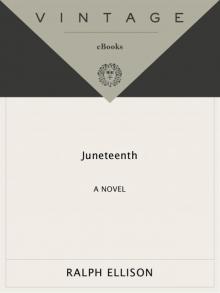 Juneteenth
Juneteenth Invisible Man
Invisible Man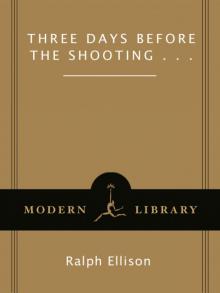 Three Days Before the Shooting . . .
Three Days Before the Shooting . . . Flying Home and Other Stories
Flying Home and Other Stories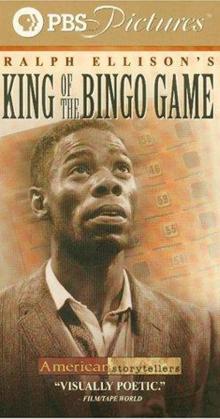 King of the Bingo Game
King of the Bingo Game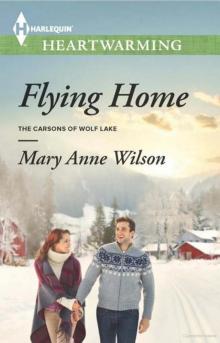 Flying Home
Flying Home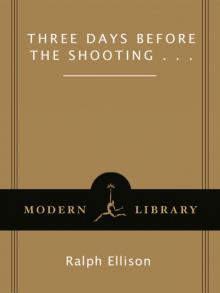 Three Days Before the Shooting ...
Three Days Before the Shooting ...